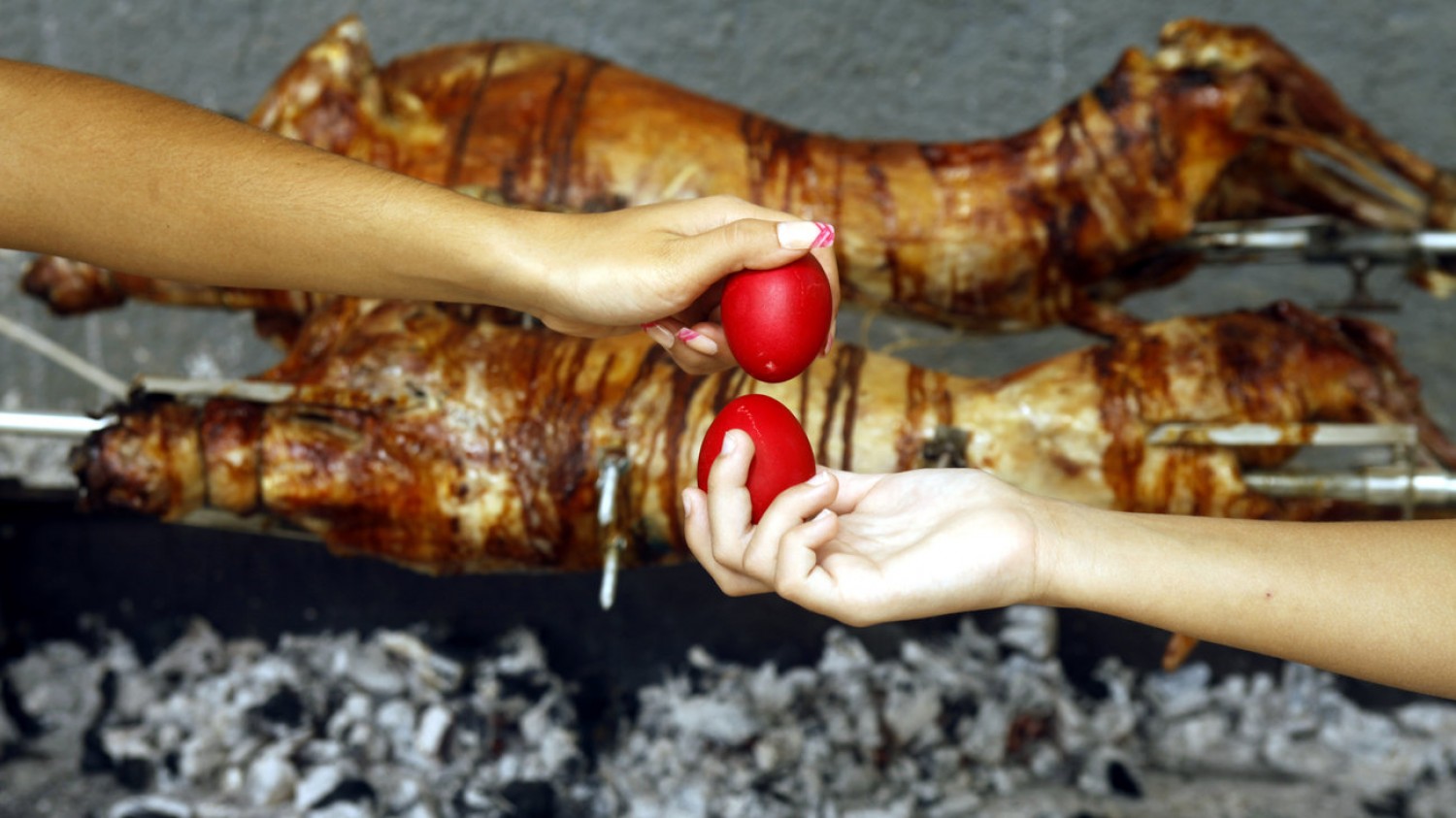
The cost of setting a traditional Easter table in Greece has risen once again this year, with families feeling the pinch from higher prices on everything from lamb to chocolate eggs. According to the Greek Consumers’ Institute (INKA), hosting an Easter dinner for eight now costs approximately €361.95 — an increase of €11 compared to 2024.
This 3.1% rise may seem modest, but when broken down, it reveals steeper hikes in key holiday staples, especially in festive sweets and eggs.
Lamb, Rooster, and the Main Course
Meat remains the biggest expense for Easter, with 10 kilograms of lamb now costing €150, based on a market price of €15/kg. Rooster, a traditional alternative for the Easter table, comes in at €23 for 1.5 kg.
Side Dishes and Add-Ons
Basic vegetables such as lettuce, onions, tomatoes, and cucumbers remain affordable but contribute incrementally to the final total. Homemade dishes like margeritsa (Easter soup) cost around €12, while tzatziki, feta, and graviera cheese add another €20+ to the mix.
Charcoal for grilling (20 kg) is now €34, a non-negligible cost for any household planning an outdoor feast.
Sweet Costs: Eggs and Tsoureki Skyrocket
The most dramatic increases are in Easter sweets — especially chocolate eggs and tsoureki, the sweet holiday bread.
- A 150g branded chocolate eggs rose from €9.48 to €11.98 (+26%)
- Non-branded chocolate eggs jumped from €3.35 to €5.80 (+73.1%)
- Larger 200g eggs saw prices nearly double, from €2.38 to €4.70 (+97.5%)
Meanwhile, tsoureki is now priced at €20 per kilo in some bakeries, and koulourakia (Easter cookies) cost around €16.55 if made at home.
Food Inflation Pressures
Food inflation remains a pressing issue across Europe, and Greece is no exception. According to Eurostat, food, alcohol, and tobacco prices rose 1.7% year-over-year in March — more than quadrupling February’s 0.4% rise. Greek Consumers have also faced noticeable increases in staples such as fish, sugar, baked goods, and coffee, pushing food inflation to an annual rate of 2.2%.
Government officials note that Greece has the second-lowest food inflation rate among eurozone countries, yet consumers continue to feel the squeeze.
For someone earning Greece’s newly increased minimum wage of €880/month (effective April 1), hosting an Easter dinner for eight would consume about 41% of their monthly income.
Source: tovima.com
Latest News

German Ambassador to Greece Talks Ukraine, Rise of Far Right & Tariffs at Delphi Economic Forum X
Commenting on the political developments in his country, the German Ambassador stressed that it was clear the rapid formation of a new government was imperative, as the expectations across Europe showed.

Athens to Return Confiscated License Plates Ahead of Easter Holiday
Cases involving court orders will also be excluded from this measure.

Servicers: How More Properties Could Enter the Greek Market
Buying or renting a home is out of reach for many in Greece. Servicers propose faster processes and incentives to boost property supply and ease the housing crisis.

FM Gerapetritis Calls for Unified EU Response to Global Crises at EU Council
"Europe is navigating through unprecedented crises — wars, humanitarian disasters, climate emergencies," he stated.

Holy Week Store Hours in Greece
Retail stores across Greece are now operating on extended holiday hours for Holy Week, following their Sunday opening on April 13. The move aims to accommodate consumers ahead of Easter, but merchants remain cautious amid sluggish market activity.

Green Getaway Ideas for Easter 2025 in Greece
Celebrate Easter 2025 in Greece the sustainable way with eco-farms, car-free islands, and family-friendly getaways rooted in nature and tradition.

Civil Protection Minister Details Summer Firefighting Plans at Delphi Forum
At the 10th Delphi Economic Forum, Minister of Climate Crisis and Civil Protection Yiannis Kefalogiannis discussed Greece's plans for the upcoming fire season.

How Shops and Markets Will Operate During Easter Holy Week
The Easter holiday schedule has been in effect since April 10, with retail stores open Palm Sunday, and most supermarkets also operating to meet consumer demand for Easter shopping

Why Is the French Aircraft Carrier Charles De Gaulle in Piraeus?
Docking in Piraeus after a four-month deployment in the Indo-Pacific region, the admiral of the aircraft carrier the Charles de Gaulle says, "Greece is our best partner in the Mediterranean."

Riots and Vandalism in Downtown Athens Exarcheia Region
Night of unrest in downtown Athens' region of Exarcheia – 11 Cars Burned, 72 Detentions








































 Αριθμός Πιστοποίησης
Αριθμός Πιστοποίησης